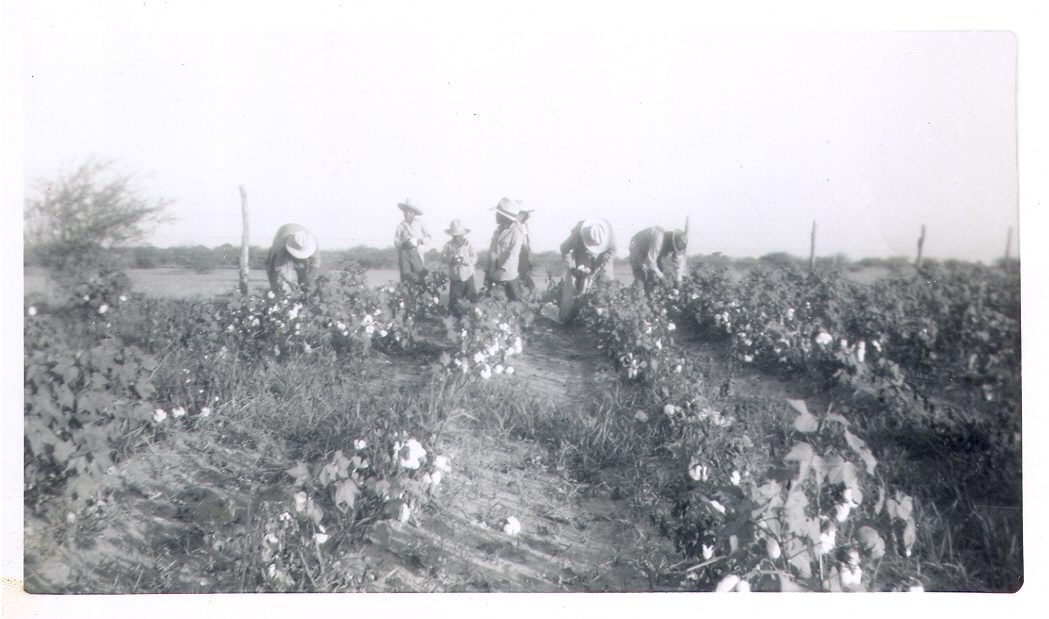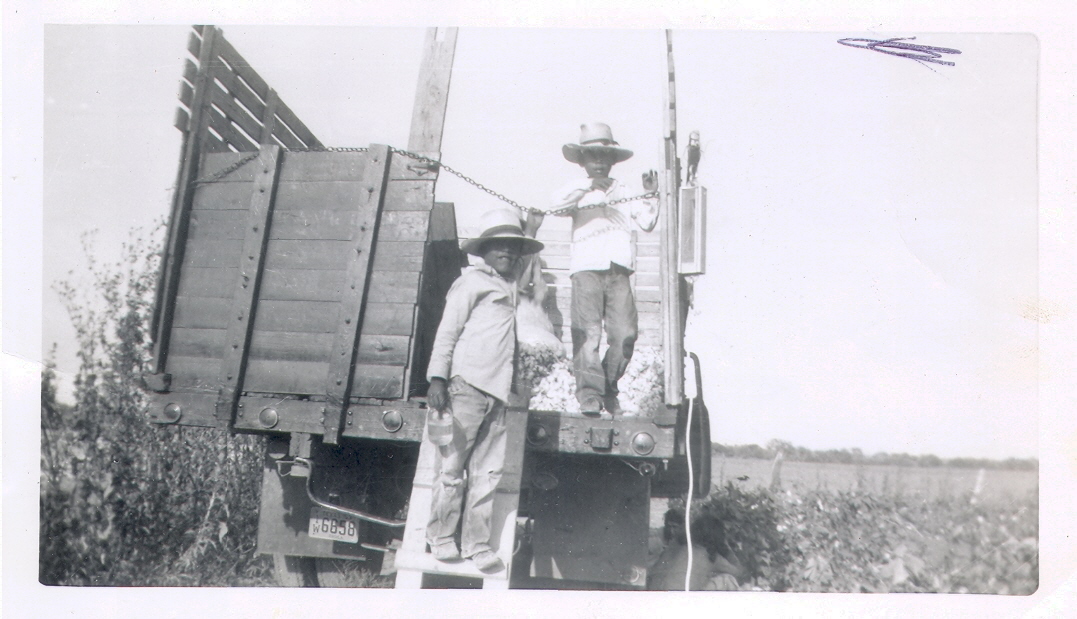TRANSCRIPTION
How did you travel to Wisconsin and what was the weather like?
We drove in a truck that had boards on the side of it, which had about five or six families in the back. It was summer time and very hot.
What did you pick in the fields and how much would you get paid?
In Wisconsin we picked potatoes and pickles. They would pay us by the bushel for the potatoes and pounds for the pickles. They would weigh them at Libby's Manufacturing Company.
Where did you live when working the fields?
The farmer or owner provided a house for each family that had either one bed or two beds we had no utilities though. There was no water or bathroom in the house we ran a water hoes to storage where we would take a shower. We had no hot water, so if you wanted to take a hot shower you would have to warm the water up in a tub. There were no bathrooms we had an outhouse.

What time did you start and end working and did you have breaks?
In Minnesota we started at six and worked till it got dark, say until about eight or nine in the evening. It was all hoeing, weeding and thinning. If the big plants were to close together we would have to thin them with a hoe about eight inches apart. At that time we got paid by contract. They were paying so much an acre. They paid by acre not by hours, it was all measured according to the length of the roles like maybe seven roles where half a mile long and that would make an acre. So we would get paid $19 dollars an acre. At the end of your contract they would figure out how many acres you worked weeding and all that. Then they divided that by the acres ant that was how much you made.
How would you get food and clothes?
You were provided food vouchers while you were there, so you could go buy whatever you needed food or clothing, whatever it took for a family to live while they were gone. At the end of your contract you would go to the store and pay your bill; because those vouchers were like a credit card or debit card. At that time they didn't have any credit cards. They probably had credit cards but the owner of the field or whoever you worked for did not let migrant workers have a credit card. They either gave us vouchers or would go personally to the store an open up an account for the families.
What good memories did you have when working the fields in Minnesota?
Back then when you were working and sweating you did not have good memories. It was not a vacation, but we had some fun. We got to meet new people, learn the environment, saw how people lived in different towns, and what they did for a living. Whenever we had time we would go out and take a movie. We didn't have all that much time, it didn't rain all the time; so the only time we had to go out was when it rained because the fields were too muddy to work. So we really just didn't have much time to do just about anything because it was work seven days a week. We were traveling too far to go out there and just do nothing.
In Almond, Wisconsin we had a little more free time because over there we would go to work around seven and get off, well about four o'clock or something like that. We were picking up cucumbers they called them pickles they didn't call them cucumbers. We only picked the little ones for canning. Once they got up to normal size nobody would pick them, they would just go to waste in the field. Usually, the smaller the pickle the better the price, you know because they would use them for canning or maybe salads.
Once you were done picking pickles what else did you pick and where?
At the end of pickle season we would move over to Manitowoc, Wisconsin and start on sweet corn, carrots and green beans in Wisconsin. Over there by Lake Michigan and that it was all factory. All the vegetables were picked by machine and they would take them by trucks to the canning plant. So we used to work in the canning plant again it was Libby's. So you could actually say we were working for Libby's but at their farm. We got paid by Libby's at that time not by the farmer or the grower and they were contracted by Libby's. Another words Libby was buying their crops, so we got paid by Libby's and not the owner of the crops.


In Minnesota did you work for a manufacture or farmer and what was the ethnicity of him?
In Minnesota when we were picking sugar beets the actual owner paid us and we called him Gillman. Well I guess that was actually his last name and we stayed with his family. They were white.
Did you have any other options instead of working the fields?
At that time no, we would work the fields until winter time. The money was good back then but I did not like the work. As long as it was field work I did not like it. I did not mind working in the factory because it was all caning it was all by the hour and inside. We didn't have to be in hot, cold, or rainy weather it was all inside. Your mom and I worked up there in the canning factory until it got too cold for us. Well I didn't like the cold wheatear so we came back to Texas.
When you came back to Texas where did you live?
We came back to Devine. Where I was born and raised. I had my house where you guys were born. I use to work at a Nursery digging up fruit trees and after that I became a truck driver and got out of working the fields?
When you left school was it to go to work and why did you not stay in school?
I did not stay in school because I was too smart than. Well back then your parents where all work minded. Back then some parents had less money than others, so they would put their kids to work the more workers you had the more money you would make. It was all work and no play. Especially, if you had parents from Mexico, my parents weren't from Mexico but my father in law was. He had a big family and was always thinking about making money and saving it in the bank for a rainy day. That's who we would travel with.
 When did you get married and where?
When did you get married and where?
I got married September 22, 1962 in Antigo, Wisconsin at the Church of Christ. I don't recall why we got married there because they did have a catholic church, but we did get married by a catholic church when we got back to Texas, well a couple years later.
How did you met your wife, was it in the fields?
I meet her in Texas in a little town called Cuero. We were picking cotton, well I mean she was. I didn't do much work back then. If I could get away with it I would. My parents were picking cotton at that time not me. I was smaller like around eight or nine years old and you mom was about 12 years old.
Is there any time in your life you would have changed and why?
If I could go back in the past I would have stayed in school and not be a drop out. So I wouldn't have had to work the fields. Maybe I could of gat a better education. I probably wouldn't have gone to college because back then you didn't see very many people go to college just finish High School and took it from there. So that's probably what I would have changed. The only thing I would have regretted is if I didn't work the fields I wouldn't have met your mother or who knows maybe I would have.


Would you have stayed in any of the towns you worked in and why did you not stay?
I would have loved to stay in Manitowoc Wisconsin but my grandparents were ill, so I had to come home. I like that city because it was a fairly big city and there were a lot of friendly people. There were a lot of jobs and good entertainment over there. Basically, everything anybody needed was there compared to other little towns where there wasn't much going on. We were right on the edge where Michigan Lake was and there was a lot of boating and fishing.
Did you ever eat any of the food while picking?
Yes, of course, we ate some food while picking. I ate some pickles and carrots when we where in the factory after they were being dropped off for us to sort for canning. The owners would also let us take some potatoes and corn home for us to cook and eat with our families.
How long did it take to pick an acre?
It depend on the length of the row, so say if the row was about three quarters of a mile it would probably take me about 3 hours to finish that row.
Do you think your childhood was robbed?
No, because I was raised by my grandparents and got to do pretty much what I wanted like hang out with my friends, and stay out late. So I had a good childhood.
Why did you not get married in Texas?
Well my father-in-law was a very strict man and would of probably not let me marry my wife, because she was his best employee out of all his other children he had working the fields. So we eloped.
Why did you change your name?
I didn't change it I just switched it around from my middle name being my first name, because it did not sound right the way it was.
If given the chance would you do all over again?
Yes, but not the same way I did, because now I know how to do it more efficient and how to do it to my advantage. I would start earlier to finish earlier if I had to do it again.
Is there anything you would like to add?
No, it's been so long I don't know if I missed anything. I don't miss driving all the way out there with bumpy roads, no air condition and no shocks on the trucks. I do miss my youth and my teenage days not that I was over there running around but that's about all.

